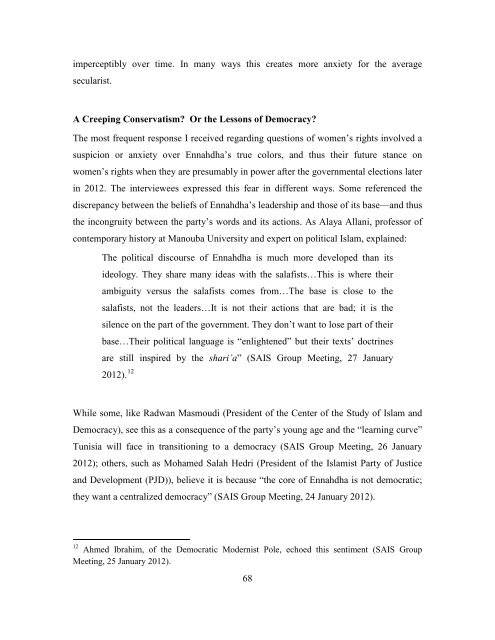Tunisia: Understanding Conflict 2012 - Johns Hopkins School of ...
Tunisia: Understanding Conflict 2012 - Johns Hopkins School of ...
Tunisia: Understanding Conflict 2012 - Johns Hopkins School of ...
Create successful ePaper yourself
Turn your PDF publications into a flip-book with our unique Google optimized e-Paper software.
imperceptibly over time. In many ways this creates more anxiety for the average<br />
secularist.<br />
A Creeping Conservatism? Or the Lessons <strong>of</strong> Democracy?<br />
The most frequent response I received regarding questions <strong>of</strong> women’s rights involved a<br />
suspicion or anxiety over Ennahdha’s true colors, and thus their future stance on<br />
women’s rights when they are presumably in power after the governmental elections later<br />
in <strong>2012</strong>. The interviewees expressed this fear in different ways. Some referenced the<br />
discrepancy between the beliefs <strong>of</strong> Ennahdha’s leadership and those <strong>of</strong> its base—and thus<br />
the incongruity between the party’s words and its actions. As Alaya Allani, pr<strong>of</strong>essor <strong>of</strong><br />
contemporary history at Manouba University and expert on political Islam, explained:<br />
The political discourse <strong>of</strong> Ennahdha is much more developed than its<br />
ideology. They share many ideas with the salafists…This is where their<br />
ambiguity versus the salafists comes from…The base is close to the<br />
salafists, not the leaders…It is not their actions that are bad; it is the<br />
silence on the part <strong>of</strong> the government. They don’t want to lose part <strong>of</strong> their<br />
base…Their political language is “enlightened” but their texts’ doctrines<br />
are still inspired by the shari’a” (SAIS Group Meeting, 27 January<br />
<strong>2012</strong>). 12<br />
While some, like Radwan Masmoudi (President <strong>of</strong> the Center <strong>of</strong> the Study <strong>of</strong> Islam and<br />
Democracy), see this as a consequence <strong>of</strong> the party’s young age and the “learning curve”<br />
<strong>Tunisia</strong> will face in transitioning to a democracy (SAIS Group Meeting, 26 January<br />
<strong>2012</strong>); others, such as Mohamed Salah Hedri (President <strong>of</strong> the Islamist Party <strong>of</strong> Justice<br />
and Development (PJD)), believe it is because “the core <strong>of</strong> Ennahdha is not democratic;<br />
they want a centralized democracy” (SAIS Group Meeting, 24 January <strong>2012</strong>).<br />
12 Ahmed Ibrahim, <strong>of</strong> the Democratic Modernist Pole, echoed this sentiment (SAIS Group<br />
Meeting, 25 January <strong>2012</strong>).<br />
68
















